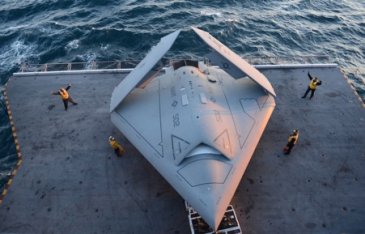By Ian G. R. Shaw
There isn’t a day goes by without predictions—wild, wacky, and horrifying—about the future of warfare. Robots stand at the centre of so many of these prophecies.
Although robots have existed for decades, and even longer in the human imagination, recent leaps in artificial intelligence (AI) promise to break with old limits. Robots that are no longer soldered to factory floors, are now crawling on the ground, whizzing in the sky in swarms, or skimming the seas. Robots are thus set to rewire the exercise and spaces of state (and non-state) power. The who, or rather, the what, of warfare is shifting. What’s not yet clear is how.

In 2013, the US Navy’s X-47B became the first autonomous drone to land on an aircraft carrier. Photo by Timothy Walker. Wikimedia Commons
Academics have written extensively on how drone warfare has transformed sovereignty, territory, and power. But autonomous robots—rather than simply remotely piloted systems—are qualitatively different from the Predator and Reaper drones of the war on terror. Autonomous AI enables robots to act for themselves, severing their dependency on humans. Will these future robots revolutionize the battlespace and upturn the logics of organized violence? Or will they simply exacerbate pre-existing modes, geographies, and infrastructures of world politics? And how will the US military project its dominance in the robotic age? These types of questions motivated me to write my recent Security Dialogue article, “Robot Wars: US Empire and Geopolitics in the Robotic Age.”
How are robots changing the fields of reality in which power and violence are exercised?
I’ve long been fascinated with robots. Whether good or bad, our cultural perception of robots is suffused by decades of science-fiction. Think Terminator, or Robocop, or Ex-Machina. These kinds of fictional robots, with steel skeletons and artificial flesh, fascinate us precisely because they press against our humanity. As these humanoids get closer to who we are, the ethical and moral quandaries only intensify. And on the battlespaces of the future, these quandaries may indeed be commonplace. But we are not there yet. We remain at the dawn of war in the robotic age. Which is why it’s so interesting to investigate the futurologies conjured by the US defense community. What’s important is not whether these military futures will actualize—but the type of work they do now: facilitating research, investment, and pre-emptive strategic changes.
My article attempts to theorize the looming robot wars. As a political geographer, I’m keenly interested in what we might call a spatial or worldly understanding of robots. That is, on a deep ontological level, I ask: How are robots changing the fields of reality in which power and violence are exercised? To answer this, I construct what I term a “a more-than-human geopolitics” to examine how robots are materializing new security worlds. This framework narrows to focus on how robots are shifting the logics and infrastructures of US empire. The term empire highlights the dominance of the US military in world politics—together with the geohistories of the US as an empire-state. But what of empire in age of robotic proxies?

A swarm of swallows. Photo by US Fish and Wildlife Service. Wikimedia Commons.
I answer this by constructing three spatial concepts: (1) Swarm-space; (2) Roboworld; and (3) the Autogenic Battle-Site. Animated by advanced and autonomous AI, an important new robotic geography will be the non-linear swarm-spaces of miniaturized drones cooperating in emergent, atmospheric formations. Mass, it appears, is back: yet mass in future conflicts mirrors the swarms of bees, fish, ants, and birds in the natural world. After exploring the planetary basing strategies of drones in Roboworld, the final part of the paper examines the autogenic battle-site. This is the name I give to the robotic battlespace of the future: where robots don’t simply respond to the directions of pilots, but autonomously generate, target, and neutralize threat conditions in real-time.
In short, robots will materialize new geographies of state violence. This evolves conflict from the discrete battlefields of old wars, the eventful battlespaces of new wars, to the robotic battle-sites of swarm wars. In the conclusion of the paper—A Robot Empire—I discuss some of the consequences that robot wars will have for accountability. The risk is that democracy is alienated from the act of killing—on the loop, but no longer in the loop. An empire of indifference fought by imperial robots.